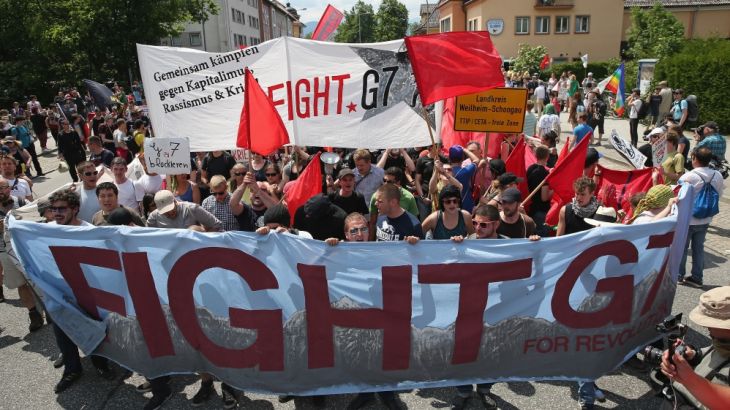Protesters clash with police ahead of G7 summit
Leaders of industrial nations gather for two-day summit in German town as they are accused of favouring corporations.

Leaders from the Group of Seven (G7) industrial nations will meet on Sunday in a German Alpine resort town, as thousands protested on the eve of the two-day summit.
There were sporadic clashes with police and several marchers were taken to hospital with injuries, as thousands marched in the town of Garmisch-Partenkirchen on Saturday.
Keep reading
list of 4 items‘Nothing to apologise for’: Merkel defends Russia legacy
The mixed legacy of Angela Merkel
What is next for Germany after Angela Merkel?
Protester Monika Lambert said she had come “to exercise my democratic rights to say that everything the G-7 decides is in the interest of the banks and capitalists”.
The Germans have deployed 17,000 police around the former winter Olympic Games venue at the foot of Germany’s highest mountain, the Zugspitze. Another 2,000 are on stand-by across the border in Austria.
The demonstrations have so far been peaceful, Hans-Peter Kammerer, a police spokesman, said on Saturday, but that significant numbers of “extremists” from Germany, Austria, Italy, and Britain were thought to be joining the expected crowd of about 8,000.
Al Jazeera’s Dominic Kane, reporting from Garmisch-Partenkirchen, said “protesters have promised to try to disrupt the proceedings as much as they can”.
|
|
The leaders in attendance are expected to discuss such global issues as security, energy and the economy.
Agenda
Host Angela Merkel is hoping to secure commitments from her G7 guests to tackle global warming to build momentum in the run-up to a major United Nations climate summit in Paris in December. The German agenda also foresees discussions on global health issues, from Ebola to antibiotics and tropical diseases.
But on the evening before the German chancellor welcomes the leaders of Britain, Canada, France, Italy, Japan, and the United States, she and French President Francois Hollande were forced into their fourth emergency phone call in 10 days with Greek Prime Minister Alexis Tsipras to try to break a deadlock between Athens and its international creditors.
The two sides have been wrangling for months over the terms of a cash-for-reform deal for Greece. Without aid from eurozone partners and the IMF, Greece could default on its loans within weeks, possibly forcing it out of the currency bloc.
An upsurge of violence in eastern Ukraine will also play a prominent role at the meeting at Schloss Elmau, a luxury hotel perched in the picturesque mountains of southern Germany.
Henchmen of bankers
European monitors have blamed the bloodshed on Russian-backed separatists and the leaders could decide at the summit to send a strong message to President Vladimir Putin, who was frozen out of what used to be the G8 after Moscow’s annexation of Crimea last year.
Merkel is due to hold talks with US President Barack Obama on Sunday morning before the summit gets under way, with Ukraine, Middle East turmoil and the TTIP free trade agreement being negotiated between Washington and the European Union at the top of the agenda.
Simon Ernst, a spokesperson for the protesters, said they wanted to show their anger at the G7 leaders, calling them “the henchmen of bankers and corporations”.
Oxfam, the anti-poverty charity, staged a colourful protest on Saturday, depicting the G7 leaders with huge heads and kitted out with walking boots and maps.
The charity is urging the leaders from the Group of Seven industrial countries to find the “right path” to overcome poverty and inequality.
Steffen Kuessner, a spokesperson for Oxfam, said social inequality was missing from the leaders’ agenda.
“The leaders have lost their way on the path to a world without poverty,” said Kuessner.
“They have to choose the right path between growing social inequality or fighting poverty, and to do so they must reform international tax regulations, among other things.”